before/ago,since用法
- 格式:doc
- 大小:41.50 KB
- 文档页数:4
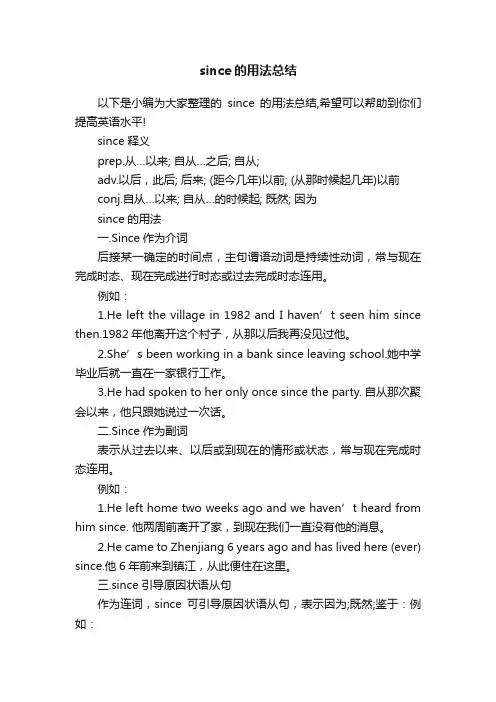
since的用法总结以下是小编为大家整理的since的用法总结,希望可以帮助到你们提高英语水平!since释义prep.从…以来; 自从…之后; 自从;adv.以后,此后; 后来; (距今几年)以前; (从那时候起几年)以前conj.自从…以来; 自从…的时候起; 既然; 因为since的用法一.Since作为介词后接某一确定的时间点,主句谓语动词是持续性动词,常与现在完成时态、现在完成进行时态或过去完成时态连用。
例如:1.He left the village in 1982 and I haven’t seen him since then.1982年他离开这个村子,从那以后我再没见过他。
2.She’s been working in a bank since leaving school.她中学毕业后就一直在一家银行工作。
3.He had spoken to her only once since the party. 自从那次聚会以来,他只跟她说过一次话。
二.Since作为副词表示从过去以来、以后或到现在的情形或状态,常与现在完成时态连用。
例如:1.He left home two weeks ago and we haven’t heard from him since. 他两周前离开了家,到现在我们一直没有他的消息。
2.He came to Zhenjiang 6 years ago and has lived here (ever) since.他6年前来到镇江,从此便住在这里。
三.since引导原因状语从句作为连词,since可引导原因状语从句,表示因为;既然;鉴于:例如:1.He didn’t come since he was busy.他因为忙,所以没有来。
2.Since this method doesn’t work,let’s try anoter.既然这种方法不行,我们就试用另一种吧。
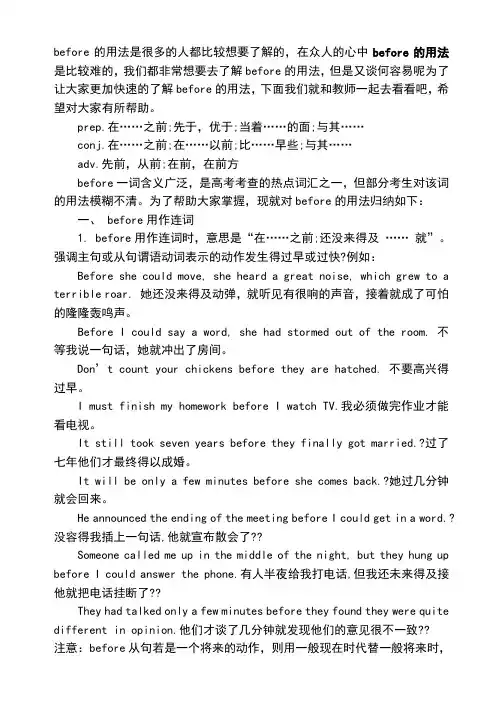
before的用法是很多的人都比较想要了解的,在众人的心中before的用法是比较难的,我们都非常想要去了解before的用法,但是又谈何容易呢为了让大家更加快速的了解before的用法,下面我们就和教师一起去看看吧,希望对大家有所帮助。
prep.在……之前;先于,优于;当着……的面;与其……conj.在……之前;在……以前;比……早些;与其……adv.先前,从前;在前,在前方before一词含义广泛,是高考考查的热点词汇之一,但部分考生对该词的用法模糊不清。
为了帮助大家掌握,现就对before的用法归纳如下:一、 before用作连词1. before用作连词时,意思是“在……之前;还没来得及…… 就”。
强调主句或从句谓语动词表示的动作发生得过早或过快?例如:Before she could move, she heard a great noise, which grew to a terrible roar. 她还没来得及动弹,就听见有很响的声音,接着就成了可怕的隆隆轰鸣声。
Before I could say a word, she had stormed out of the room. 不等我说一句话,她就冲出了房间。
Don’t count your chickens before they are hatched. 不要高兴得过早。
I must finish my homework before I watch TV.我必须做完作业才能看电视。
It still took seven years before they finally got married.?过了七年他们才最终得以成婚。
It will be only a few minutes before she comes back.?她过几分钟就会回来。
He announced the ending of the meeting before I could get in a word.?没容得我插上一句话,他就宣布散会了??Someone called me up in the middle of the night, but they hung up before I could answer the phone.有人半夜给我打电话,但我还未来得及接他就把电话挂断了??They had talked only a few minutes before they found they were quite different in opinion.他们才谈了几分钟就发现他们的意见很不一致??注意:before从句若是一个将来的动作,则用一般现在时代替一般将来时,如上句中的comes。
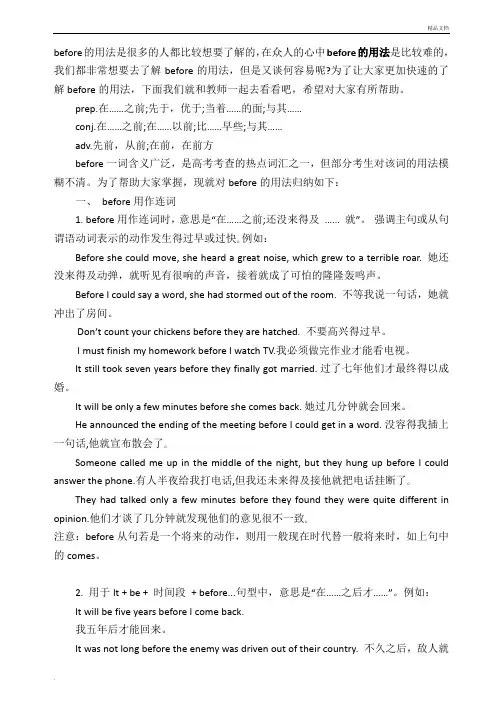
before的用法是很多的人都比较想要了解的,在众人的心中before的用法是比较难的,我们都非常想要去了解before的用法,但是又谈何容易呢?为了让大家更加快速的了解before的用法,下面我们就和教师一起去看看吧,希望对大家有所帮助。
prep.在……之前;先于,优于;当着……的面;与其……conj.在……之前;在……以前;比……早些;与其……adv.先前,从前;在前,在前方before一词含义广泛,是高考考查的热点词汇之一,但部分考生对该词的用法模糊不清。
为了帮助大家掌握,现就对before的用法归纳如下:一、before用作连词1. before用作连词时,意思是“在……之前;还没来得及…… 就”。
强调主句或从句谓语动词表示的动作发生得过早或过快。例如:Before she could move, she heard a great noise, which grew to a terrible roar. 她还没来得及动弹,就听见有很响的声音,接着就成了可怕的隆隆轰鸣声。
Before I could say a word, she had stormed out of the room. 不等我说一句话,她就冲出了房间。
Don’t count your chickens before they are hatched. 不要高兴得过早。
I must finish my homework before I watch TV.我必须做完作业才能看电视。
It still took seven years before they finally got married. 过了七年他们才最终得以成婚。
It will be only a few minutes before she comes back. 她过几分钟就会回来。
He announced the ending of the meeting before I could get in a word. 没容得我插上一句话,他就宣布散会了。Someone called me up in the middle of the night, but they hung up before I could answer the phone.有人半夜给我打电话,但我还未来得及接他就把电话挂断了。They had talked only a few minutes before they found they were quite different in opinion.他们才谈了几分钟就发现他们的意见很不一致。注意:before从句若是一个将来的动作,则用一般现在时代替一般将来时,如上句中的comes。
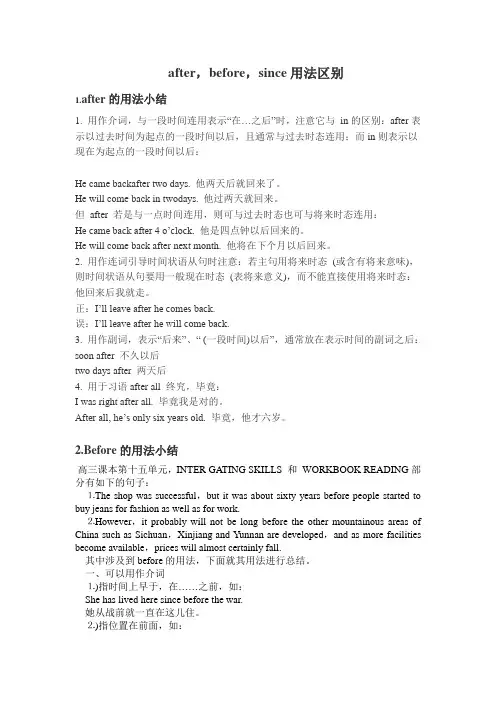
after,before,since用法区别1.after的用法小结1. 用作介词,与一段时间连用表示“在…之后”时,注意它与in的区别:after表示以过去时间为起点的一段时间以后,且通常与过去时态连用;而in则表示以现在为起点的一段时间以后:He came backafter two days. 他两天后就回来了。
He will come back in twodays. 他过两天就回来。
但after 若是与一点时间连用,则可与过去时态也可与将来时态连用:H e came back after 4 o’clock. 他是四点钟以后回来的。
He will come back after next month. 他将在下个月以后回来。
2. 用作连词引导时间状语从句时注意:若主句用将来时态(或含有将来意味),则时间状语从句要用一般现在时态(表将来意义),而不能直接使用将来时态:他回来后我就走。
正:I’ll leave after he comes back.误:I’ll leave after he will come back.3. 用作副词,表示“后来”、“ (一段时间)以后”,通常放在表示时间的副词之后:soon after 不久以后two days after 两天后4. 用于习语after all 终究,毕竟:I was right after all. 毕竟我是对的。
After all, he’s only six years old. 毕竟,他才六岁。
2.Before的用法小结高三课本第十五单元,INTER GATING SKILLS 和WORKBOOK READING部分有如下的句子:⒈The shop was successful,but it was about sixty years before people started to buy jeans for fashion as well as for work.⒉However,it probably will not be long before the other mountainous areas of China such as Sichuan,Xinjiang and Yunnan are developed,and as more facilities become available,prices will almost certainly fall.其中涉及到before的用法,下面就其用法进行总结。
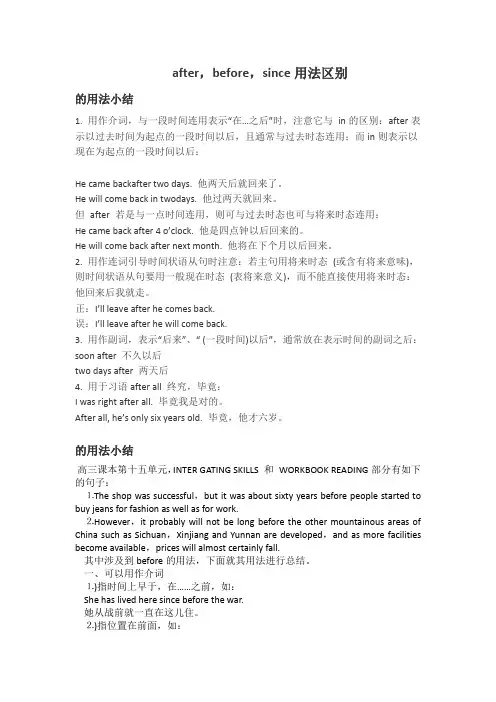
after,before,since用法区别的用法小结1. 用作介词,与一段时间连用表示“在…之后”时,注意它与in的区别:after表示以过去时间为起点的一段时间以后,且通常与过去时态连用;而in则表示以现在为起点的一段时间以后:He came backafter two days. 他两天后就回来了。
He will come back in twodays. 他过两天就回来。
但after 若是与一点时间连用,则可与过去时态也可与将来时态连用:He came back after 4 o’clock. 他是四点钟以后回来的。
He will come back after next month. 他将在下个月以后回来。
2. 用作连词引导时间状语从句时注意:若主句用将来时态(或含有将来意味),则时间状语从句要用一般现在时态(表将来意义),而不能直接使用将来时态:他回来后我就走。
正:I’ll leave after he comes back.误:I’ll leave after he will come back.3. 用作副词,表示“后来”、“ (一段时间)以后”,通常放在表示时间的副词之后:soon after 不久以后two days after 两天后4. 用于习语after all 终究,毕竟:I was right after all. 毕竟我是对的。
After all, he’s only six years old. 毕竟,他才六岁。
的用法小结高三课本第十五单元,INTER GATING SKILLS 和WORKBOOK READING部分有如下的句子:⒈The shop was successful,but it was about sixty years before people started to buy jeans for fashion as well as for work.⒉However,it probably will not be long before the other mountainous areas of China such as Sichuan,Xinjiang and Yunnan are developed,and as more facilities become available,prices will almost certainly fall.其中涉及到before的用法,下面就其用法进行总结。
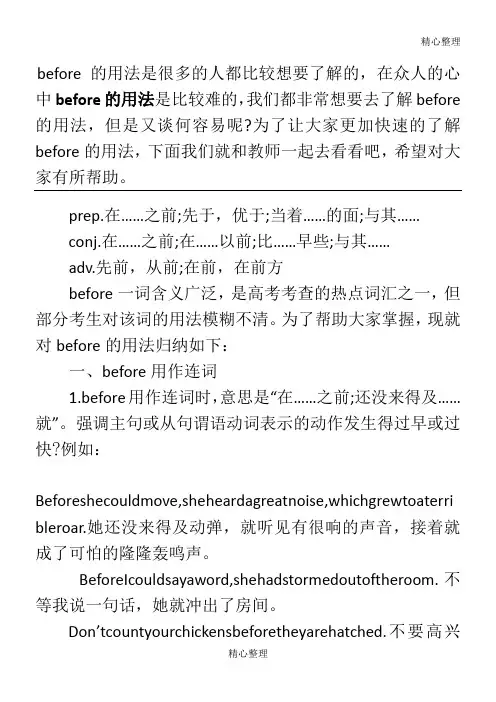
精心整理before的用法是很多的人都比较想要了解的,在众人的心中before的用法是比较难的,我们都非常想要去了解before 的用法,但是又谈何容易呢?为了让大家更加快速的了解before的用法,下面我们就和教师一起去看看吧,希望对大家有所帮助。
现就对及eroar.她还没来得及动弹,就听见有很响的声音,接着就成了可怕的隆隆轰鸣声。
BeforeIcouldsayaword,shehadstormedoutoftheroom.不等我说一句话,她就冲出了房间。
Don’tcountyourchickensbeforetheyarehatched.不要高兴得过早。
ImustfinishmyhomeworkbeforeIwatchTV.我必须做完作业才能看电视。
Itstilltooksevenyearsbeforetheyfinallygotmarried.?过了七年他们才最终得以成婚。
一致注意:before从句若是一个将来的动作,则用一般现在时代替一般将来时,如上句中的comes。
2.用于It+be+时间段+before...句型中,意思是“在……之后才……”。
例如:ItwillbefiveyearsbeforeIcomeback.我五年后才能回来。
Itwasnotlongbeforetheenemywasdrivenoutoftheircountry.不久之后,敌人就被赶走了。
如果主句中用否定式,则表示“不多久……就”。
Itwon’tbelongb eforetheyunderstandeachother.他们不久就他之前”(1成(2Ladiesbeforegentlemen.女士优先。
(3)表示位置,与behind相对(相当于infrontof)。
如:BeforeLucyisLily.?莉莉在露茜的前面。
Don’tputthecartbeforet hehorse.不要本末倒置。
(4)表示“在……面前;与……面对面”。
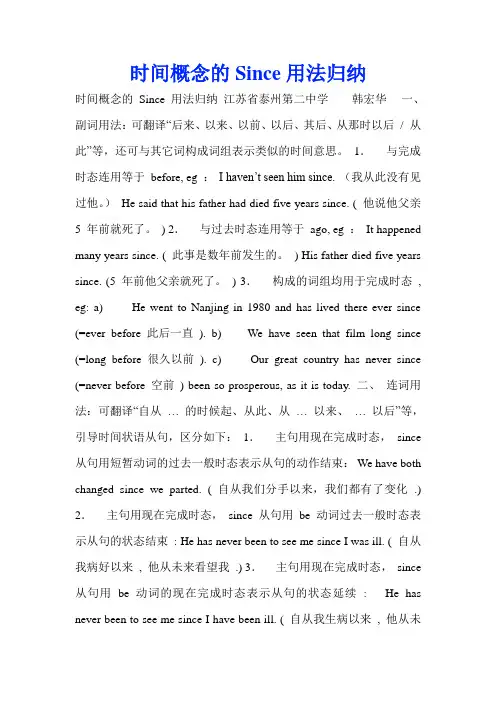
时间概念的Since用法归纳时间概念的Since 用法归纳江苏省泰州第二中学韩宏华一、副词用法:可翻译“后来、以来、以前、以后、其后、从那时以后/ 从此”等,还可与其它词构成词组表示类似的时间意思。
1.与完成时态连用等于before, eg :I haven’t seen him since. (我从此没有见过他。
)He said that his father had died five years since. ( 他说他父亲5 年前就死了。
) 2.与过去时态连用等于ago, eg :It happened many years since. ( 此事是数年前发生的。
) His father died five years since. (5 年前他父亲就死了。
) 3.构成的词组均用于完成时态, eg: a) He went to Nanjing in 1980 and has lived there ever since (=ever before 此后一直). b) We have seen that film long since (=long before 很久以前). c) Our great country has never since (=never before 空前) been so prosperous, as it is today. 二、连词用法:可翻译“自从… 的时候起、从此、从… 以来、… 以后”等,引导时间状语从句,区分如下:1.主句用现在完成时态,since 从句用短暂动词的过去一般时态表示从句的动作结束:We have both changed since we parted. ( 自从我们分手以来,我们都有了变化.) 2.主句用现在完成时态,since 从句用be 动词过去一般时态表示从句的状态结束: He has never been to see me since I was ill. ( 自从我病好以来, 他从未来看望我.) 3.主句用现在完成时态,since 从句用be 动词的现在完成时态表示从句的状态延续: He has never been to see me since I have been ill. ( 自从我生病以来, 他从未来看望我.) 4.主句用现在完成时态,since 从句用延续动词的现在完成时态表示从句的动作延续: 5.He hasn’t seen me since I have lived here. ( 自从我住在这里以来, 他还没有看望过我.) 6.主句用现在完成时态,since 从句用延续动词的一般时态表示从句的动作结束: He hasn’t seen me since I lived here. ( 自从我不住在这里以来, 他就没有看望过我.) =He hasn’t seen me since I left here. 三、句型用法:1.主句用现在完成时,从句用一般现在时:I have done translation since I know English. 2.主句用系动词的一般现在时,从句用一般过去时:He feels much better since he took some medicine. 3.主句用现在进行时,从句用一般过去时: I am walking to work since my bike broke down. 4.It is + 时段+since 从句(短暂动词的过去式)It is two years since he joined the army. 5.It was + 时段+since 从句(短暂动词的过去完成式)It was four years since we had parted. 6.It has been+ 时段+since 从句(短暂动词的现在完成时)It has been about five months since I have heard from him. 7.It is + 时段+since 从句(延续动词的现在完成时)It is a long while since I have been at home. ( 我自从离家已有好长一段时间了。
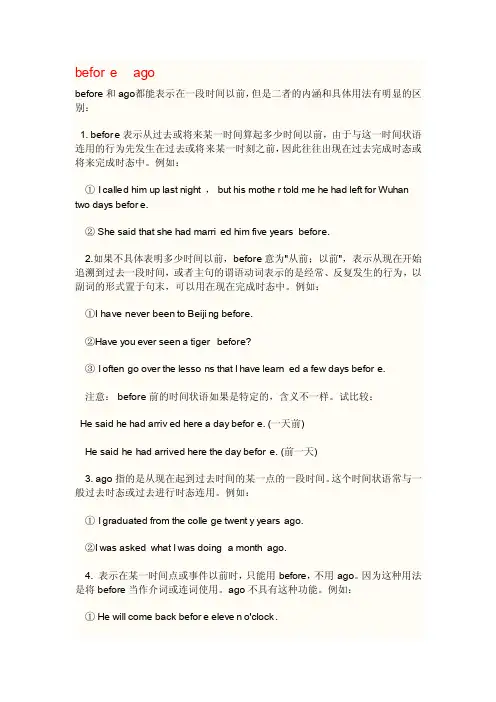
before agobefore和ago都能表示在一段时间以前,但是二者的内涵和具体用法有明显的区别:1. before表示从过去或将来某一时间算起多少时间以前,由于与这一时间状语连用的行为先发生在过去或将来某一时刻之前,因此往往出现在过去完成时态或将来完成时态中。
例如:① I called him up last night, but his mother told me he had left for Wuhantwo days before.② She said that she had marrie d him five yearsbefore.2.如果不具体表明多少时间以前,before意为"从前;以前",表示从现在开始追溯到过去一段时间,或者主句的谓语动词表示的是经常、反复发生的行为,以副词的形式置于句末,可以用在现在完成时态中。
例如:①I have neverbeen to Beijin g before.②Have you ever seen a tigerbefore?③ I oftengo over the lesson s that I have learne d a few days before.注意: before前的时间状语如果是特定的,含义不一样。
试比较:He said he had arrive d here a day before. (一天前)He said he had arrive d here the day before. (前一天)3. ago指的是从现在起到过去时间的某一点的一段时间。
这个时间状语常与一般过去时态或过去进行时态连用。
例如:① I gradua ted from the colleg e twenty yearsago.②I was askedwhat I was doinga monthago.4. 表示在某一时间点或事件以前时,只能用bef ore,不用ago。
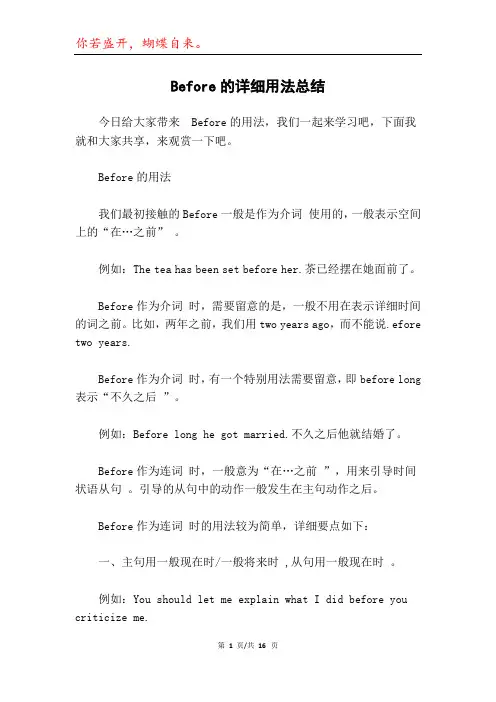
Before的详细用法总结今日给大家带来Before的用法,我们一起来学习吧,下面我就和大家共享,来观赏一下吧。
Before的用法我们最初接触的Before一般是作为介词使用的,一般表示空间上的“在…之前” 。
例如:The tea has been set before her.茶已经摆在她面前了。
Before作为介词时,需要留意的是,一般不用在表示详细时间的词之前。
比如,两年之前,我们用two years ago,而不能说.efore two years.Before作为介词时,有一个特别用法需要留意,即before long 表示“不久之后”。
例如:Before long he got married.不久之后他就结婚了。
Before作为连词时,一般意为“在…之前”,用来引导时间状语从句。
引导的从句中的动作一般发生在主句动作之后。
Before作为连词时的用法较为简单,详细要点如下:一、主句用一般现在时/一般将来时 ,从句用一般现在时。
例如:You should let me explain what I did before you criticize me.在你批判我之前,你应当让我解释一下我做过什么。
二、主句用过去完成时 ,从句用一般过去时。
一般翻译为“在…之前就… ”。
例如:1.His father had died before he was born.他父亲在他诞生之前就已经去世了。
2.She had finished her homework before her mother returned.她在妈妈返回之前就已经把作业完成了。
三、主句用一般过去时 ,从句用过去完成时。
从句用过去完成时表示一个过去没有完成或没来得及做的、时间挨次在后的动作,常译为“★还没(来得及)…就…★ ”。
例如:1.He rushed out of the office before I had realized what was happening.我还没意识到发生了什么事,他就冲出去了。
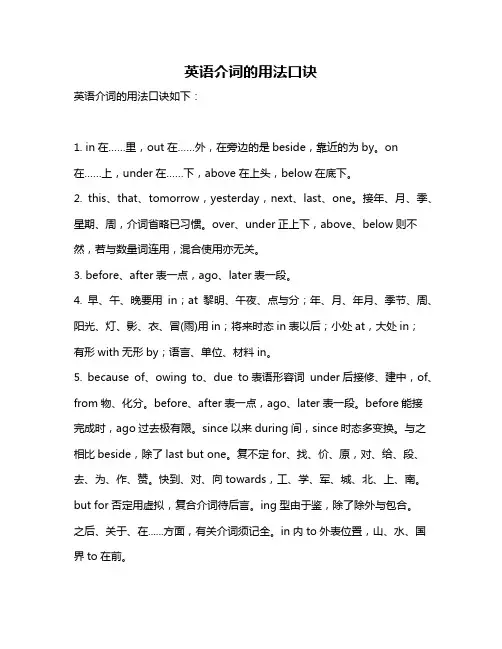
英语介词的用法口诀英语介词的用法口诀如下:1. in在……里,out在……外,在旁边的是beside,靠近的为by。
on 在……上,under在……下,above在上头,below在底下。
2. this、that、tomorrow,yesterday,next、last、one。
接年、月、季、星期、周,介词省略已习惯。
over、under正上下,above、below则不然,若与数量词连用,混合使用亦无关。
3. before、after表一点,ago、later表一段。
4. 早、午、晚要用in;at黎明、午夜、点与分;年、月、年月、季节、周、阳光、灯、影、衣、冒(雨)用in;将来时态in表以后;小处at,大处in;有形with无形by;语言、单位、材料in。
5. because of、owing to、due to表语形容词under后接修、建中,of、from物、化分。
before、after表一点,ago、later表一段。
before能接完成时,ago过去极有限。
since以来during间,since时态多变换。
与之相比beside,除了last but one。
复不定for、找、价、原,对、给、段、去、为、作、赞。
快到、对、向towards,工、学、军、城、北、上、南。
but for否定用虚拟,复合介词待后言。
ing型由于鉴,除了除外与包合。
之后、关于、在......方面,有关介词须记全。
in内to外表位置,山、水、国界to在前。
6. 日子前面却不行。
遇到几号要用on,上午下午又是in。
要说某日上下午,用on换in才能行。
午夜黄昏用at,黎明用它也不借。
at也在时分前,说“差”用to,说“过”要用part。
7. over、under正上下,above在上头,below在底下。
若与数量词连用,混合使用亦无关。
8. besides,except分内外,among之内along沿。
同类比较except,加for异类记心间。
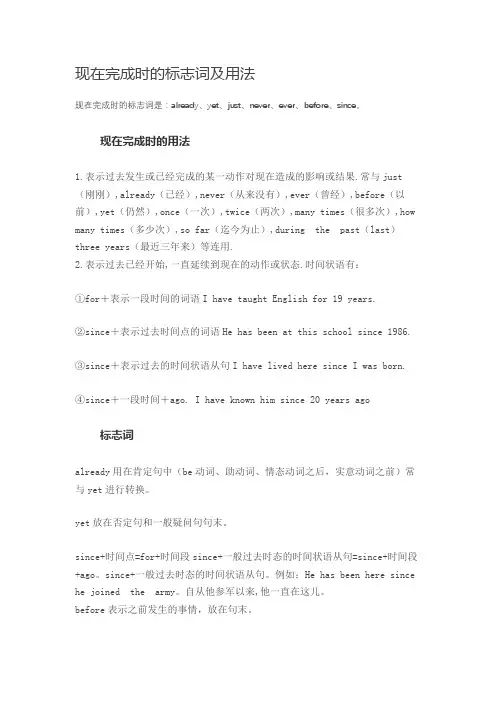
现在完成时的标志词及用法现在完成时的标志词是:already、yet、just、never、ever、before、since。
现在完成时的用法1.表示过去发生或已经完成的某一动作对现在造成的影响或结果.常与just (刚刚),already(已经),never(从来没有),ever(曾经),before(以前),yet(仍然),once(一次),twice(两次),many times(很多次),how many times(多少次),so far(迄今为止),during the past(last)three years(最近三年来)等连用.2.表示过去已经开始,一直延续到现在的动作或状态.时间状语有:①for+表示一段时间的词语I have taught English for 19 years.②since+表示过去时间点的词语He has been at this school since 1986.③since+表示过去的时间状语从句I have lived here since I was born.④since+一段时间+ago. I have known him since 20 years ago标志词already用在肯定句中(be动词、助动词、情态动词之后,实意动词之前)常与yet进行转换。
yet放在否定句和一般疑问句句末。
since+时间点=for+时间段since+一般过去时态的时间状语从句=since+时间段+ago。
since+一般过去时态的时间状语从句。
例如:He has been here since he joined the army。
自从他参军以来,他一直在这儿。
before表示之前发生的事情,放在句末。
just表示刚刚做过的事情,放在have/has后面。
Before 用法小结一、作连词,引导时间状语从句1、把 before 译成“在… …之间”,这时主句与 before 从句中的两个动作按时间先后依次发生。
如:It was evening before we reached the little town of Winchester. (在他们到达小城镇之前就是晚上了。
)2、把 before 译成为“以后……才”,副词“才”在汉语中强调某事发生得晚或者慢。
如: The American Civil was lasted four years before the North won in the end. (美国南北战争持续了四年之后北方才最终取得了胜利。
)3、把 before 译成“不久……就”,目的在于强调主句动作发生在从句的动作以前。
如: ---Why didn’t you tell him about the meeting? ---He rushed out of the room before I could say a word. (我还没来及说一句话,他就冲出了房间。
)4、把 be f o re 译成“尚未”,“还没有”,“来不及”,“不要”,“别”。
如; T a ke i t before you change your mind. (买了吧,不要三心二意。
) The hawks all had flown away before we fired a shot. (我们还没有来得及发一枪,老鹰全都飞了。
) I started my meal before Adam arrived. (亚当尚未达到,我就开始吃饭了。
) He made a mistake, but then he corrected the situation before it got worse. (他出了差错,但没等其进一步恶化,他就调整了局势。
增大字体before与ago用法比较作者:佚名转贴自:本站原创点击数:875 更新时间:2004-12-6 文章录入:adminbefore与ago用法比较在教学中,笔者发现不少学生对before和ago这二个词的使用颇感棘手,滥用和混用现象很多。
为此,本文就二者在概念和使用的差异以及它们常与哪些时态连用等方面提出自己的肤浅见解,供大家讨论。
before和ago都能表示在一段时间以前,但是二者的内涵和具体用法有明显的区别:1. before表示从过去或将来某一时间算起多少时间以前,由于与这一时间状语连用的行为先发生在过去或将来某一时刻之前,因此往往出现在过去完成时态或将来完成时态中。
例如:① I called him up last night, but his mother told me he had left for Wuhan two days before.② She said that she had married him five years before.2.如果不具体表明多少时间以前,before意为“从前;以前”,表示从现在开始追溯到过去一段时间,或者主句的谓语动词表示的是经常、反复发生的行为,以副词的形式置于句末,可以用在现在完成时态中。
例如:①I have never been to Beijing before.②Have you ever seen a tiger before?③ I often go over the lessons that I have learned a few days before.注意: before前的时间状语如果是特定的,含义不一样。
试比较:He said he had arrived here a day before. (一天前)He said he had arrived here the day before. (前一天)3. ago指的是从现在起到过去时间的某一点的一段时间。
since的用法:译作“自从…以来”(1)接时间点:如I have stayed in that country since 1995. 要求:谓v.用现在完成时,而且须是延续性动词。
接一段时间+ ago:如They have lived in that house since two years ago. 要求:谓v.用现在完成时,而且须是延续性动词。
接时间状语从句:如I have loved her since I met her last time. / Lily has stayed at home since she left school. 要求:主句的谓v.用现在完成时,而且须是延续性动词;从句的谓v.用一般过去时,而且须是终止性动词。
(4)用于句型“It’s / It has been + 一段时间+ since + 时间状语从句”中,译作“自从…以来, 已经…(时间)了”。
如It’s / has been three months since he moved to this city. 要求:主句的谓v.用一般现在时或现在完成时;从句的谓v.用一般过去时,而且须是终止性动词。
(5)用于句型“一段时间+ has passed since + 时间状语从句”中,译作“自从…以来, …(时间)已经过去了”。
如上个例句还可写成:Three months has passed since he moved to this city. 要求:主句的谓v.用现在完成时,而且动词必须是has passed;从句的谓v.用一般过去时,而且须是终止性动词。
(6)注:当since用于否定句时,主句的谓v.可以是终止性动词。
如He hasn’t seen the film since last month.(7)相关词组:“从那时起”:ever since、since then、from then on. 注:ever since作为一个词组,放句尾可单独使用。
before与ago用法比较before和ago 两者均可表示在多久时间“以前”(要放在表示一段时间的词语之后),但有区别:ago 从现在向前回溯,即现在的过去,因此通常与一般过去时连用;而before 则从过去向前回溯,即指过去的过去,因此通常与过去完成时连用(尤其用于宾语从句中)。
但是二者的内涵和具体用法有明显的区别:1. before表示从过去或将来某一时间算起多少时间以前,由于与这一时间状语连用的行为先发生在过去或将来某一时刻之前,因此往往出现在过去完成时态或将来完成时态中。
例如:① I called him up last night,but his mother told me he had left for Wuhan two days before.② She said that she had married him five years before.He said they had left five days before. 他说他们5 天前就离开了。
2.如果不具体表明多少时间以前,before意为“从前;以前”,表示从现在开始追溯到过去一段时间,或者主句的谓语动词表示的是经常、反复发生的行为,以副词的形式置于句末,可以用在现在完成时态中。
例如:①I have never been to Beijing before.②Have you ever seen a tiger before?③ I often go over the lessons that I have learned a few days before.注意:before前的时间状语如果是特定的,含义不一样。
试比较:He said he had arrived here a day before. (一天前)He said he had arrived here the day before. (前一天)注:在表示推测或为使语境生动的句子中,有时也可用 ago 代替before。
Since 和for 的用法及区别:一,since 的四种用法1,since + 过去一个时间点(如具体的年、月、日期、钟点、ago. 1990 , last month , half past six I have been here since 1990. 1990起,我一直在这儿。
2,since+ 一段时间+agoI h a v e b ee n h e r e s i n c e f i v e m o n t h s a g o。
自从五个月前,我已经在这儿了。
3,since+从句GreatChanges have taken place since you left. 自从你走后,已经发生了很大的变化。
4,It is +一段时间+since从句I t i s t w o y e a r s s i n c e I b e c a m e a n E n g l i s h t e a c h e r.我成为英语老师有两年了。
二,Since 和for区别1,Since +时间点,具体时间“自从I have been in Beijing since 2010.、以来,从、、、以后”用来说明动作起始时间2,For + 时间段,用来说明动作延续时间长度,因此句中的谓语动词,也应该是延续性动词。
I have been in Beijing for one year。
We have learnt English for about three years.I have been here for 3 days. (对)I have arrived here for 3 days.(误)三,延续性动词和终止性动词的概念英语中,动词按其动作发生的方式、动作发生过程的长短,可分为延续性动词和终止性动词。
延续性动词表示能够延续的动作,这种动作可以延续下去或产生持久影响。
如:learn, work, stand, lie, know, walk, keep, have, wait, watch, sing, read, sleep,live, stay等。
before和ago都能表示在一段时间以前,但是二者的内涵和具体用法有明显的区别:1. before表示从过去或将来某一时间算起多少时间以前,由于与这一时间状语连用的行为先发生在过去或将来某一时刻之前,因此往往出现在过去完成时态或将来完成时态中。
例如:①I called him up last night,but his mother told me he had left for Wuhan two days before.②She said that she had married him five years before.2.如果不具体表明多少时间以前,before意为"从前;以前",表示从现在开始追溯到过去一段时间,或者主句的谓语动词表示的是经常、反复发生的行为,以副词的形式置于句末,可以用在现在完成时态中。
例如:①I have never been to Beijing before.②Have you ever seen a tiger before?③I often go over the lessons that I have learned a few days before.注意:before前的时间状语如果是特定的,含义不一样。
试比较:He said he had arrived here a day before. (一天前)He said he had arrived here the day before. (前一天)3. ago指的是从现在起到过去时间的某一点的一段时间。
这个时间状语常与一般过去时态或过去进行时态连用。
例如:①I graduated from the college twenty years ago.②I was asked what I was doing a month ago.4. 表示在某一时间点或事件以前时,只能用before,不用ago。
因为这种用法是将before当作介词或连词使用。
ago不具有这种功能。
例如:①He will come back before eleven o'clock.②Where did your brother study before he joined the army?③It was hoped that this would be achieved before the year 2006.5.按语法规则,ago只能与一般过去时连用,但在since three years ago这类短语中能与现在完成时态连用。
因为three years ago构成一个名词短语,共同作since的宾格,意为"自从三年前以来"。
例如:①He has been here since three years ago.②I have taught English in this school since twenty years ago.6. 含before的从句一般不用将来时态,如果采用"will / would +V."时,一般被认为是情态或虚拟语气。
例如:I would die before I would confess to it.7.如果before从句是一般过去时态,所暗示的是过去发生的事,主句则宜用过去完成时,语义偏重于过去某阶段的行为或状况时,还可与一般过去时态连用。
例如:①I had never seen a Red Army man before I arrived in Xi'an.②They asked me things that happened before the boy was born.8. 不少的语法书上说,before引导的从句习惯上不与否定的主句连用,要用until。
实际上二者都可以,有时在意义上有些区别。
试比较:He didn't arrive until I returned. 直到我回来时他才到达。
He did not arrive before I returned. 在我回来之前他尚未到达。
I didn't manage to do it until you had explained how. 直到你解释了如何干,我才设法完成了那项工作。
I didn't manage to do it before you had explained how. 你解释了如何干之后,我才设法完成了那件工作。
9. before在句中的含义比较灵活,虽然before引导的也是一个时间状语,但译成汉语时却不必死译为"在……以前"。
可以采取下面几种译法:(A)译为"……才";(B)译为"……就";(C)译为"尚未"、"还没有"、"来不及"、"不要"、"别";(D)译为"在……的时候还没有";(E)译为"如果"、"否则"、"免得";(F)译为"到"、"等到"、"没等……就";(G)译为"然后"等。
例如:A. It will be five years before we meet again. 要等五年我们才能再见面。
We waited a long time before the train arrived. 我们等了很长时间火车才到达。
B. I hadn't waited long before he came. 我没等多久他就来了。
He had not gone a mile before he felt tired. 还没走一英里路,他就觉得累了。
C. His father died before he was born. 他尚未出世他父亲就去世了。
Catch him before he escapes. 抓住他,别让他跑了。
Take this computer before you change your mind. 买了这台电脑,不要三心二意了。
D. We arrived there before it began to rain. 我们到达那里的时候还没下雨。
E. Go before I call the police. 走吧,否则我叫警察了。
I had better go now before it is too late. 我最好现在就走,免得太迟。
Pigs will fly before he'll be a scientist. 如果他当科学家,猪都会飞了。
F. The crops will die before the rain fall. 等到天下雨,庄稼早枯死了。
Before I could sit down, he offered me a cup of tea. 没等我坐下,他就给我端上一杯茶。
G. I shaved before I went to the party. 我刮了脸,然后去参加宴会。
since的用法:译作“自从…以来”(1)接时间点:如I have stayed in that country since 1995. 要求:谓v.用现在完成时,而且须是延续性动词。
(2)接一段时间+ ago:如They have lived in that house since two years ago. 要求:谓v.用现在完成时,而且须是延续性动词。
(3)接时间状语从句:如I have loved her since I met her last time. / Lily has stayed at home since she left school. 要求:主句的谓v.用现在完成时,而且须是延续性动词;从句的谓v.用一般过去时,而且须是终止性动词。
(4)用于句型“It’s / It has been + 一段时间+ since + 时间状语从句”中,译作“自从…以来, 已经…(时间)了”。
如It’s / has been three months since he moved to this city. 要求:主句的谓v.用一般现在时或现在完成时;从句的谓v.用一般过去时,而且须是终止性动词。
(5)用于句型“一段时间+ has passed since + 时间状语从句”中,译作“自从…以来, …(时间)已经过去了”。
如上个例句还可写成:Three months has passed since he moved to this city. 要求:主句的谓v.用现在完成时,而且动词必须是has passed;从句的谓v.用一般过去时,而且须是终止性动词。
(6)注:当since用于否定句时,主句的谓v.可以是终止性动词。
如He hasn’t seen the film since last month.(7)相关词组:“从那时起”:ever since、since then、from then on.注:ever since作为一个词组,放句尾可单独使用。
如I have given up smoking ever since. 另外,还可在since后接句子。
since前加ever,只是加重语气而已。
如I have given up smoking ever since I caught a bad cough.(8) since还可引导原因状语从句,译作“由于;因为”,相当于because。
如Since he was lazy, he didn’t finish his homework。